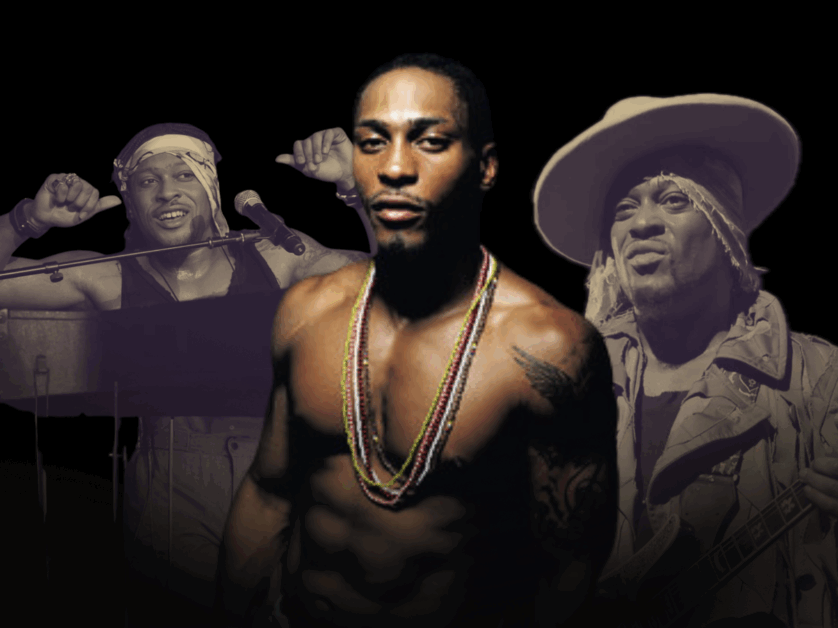Rest Well, D’Angelo.
D’Angelo was special and people are in pain at the loss of such unique, sonically masterful spirit. People are devastated—even those that didn’t meet him.
After his death was made public, singer Jill Scott immediately posted, “I told you a long time ago-You ain’t gon understand everything & everything ain’t meant 4 U ,nor I, to understand. I never met D’Angelo but I love him, respect him, admire his gift. This loss HURTS!! Love to my family that are family to him. I’m so sorry. R.I.P. GENIUS.”
I told you a long time ago-You ain’t gon understand everything & everything ain’t meant 4 U ,nor I, to understand. I never met D’Angelo but I love him, respect him, admire his gift. This loss HURTS!! Love to my family that are family to him. I’m so sorry. R.I.P. GENIUS. 💔 💔
— ⭐Jill Scott⭐ (@missjillscott) October 14, 2025
When D’Angelo missed The Roots picnic in May due to an “unforeseen illness,” it felt like a bad omen.
“I went to The Roots picnic to see him and it sucked when he did not make it,” a close friend said under anonymity. “I didn’t even want to go after that, but finding out he was close to death makes me feel terrible in retrospect.”
Michael Eugene Archer, known to the world as D’Angelo, the elusive and transformative figure who redefined R&B, Hip-Hop and soul music for the rapidly burgeoning Hip-Hop generation, left this plane Tuesday (October 14) following a private battle with pancreatic cancer. He was 51.
Born in Richmond, Virginia, D’Angelo rose from the church pews to global stages, reshaping the contours of modern Black music with his blend of gospel spirit, funk groove and even Hip-Hop edge. His arrival in the mid-1990s signaled a movement, a return to depth, authenticity and musicianship in an era dominated by glossy pop, gritty rap and commercial R&B.
Producer and industry vet Datwon Thomas said, Some just transcend the frequency that we are all on and fly higher than us while in their earthly vessels. This man did that…he also did it his way and on his timing.”

Early Brilliance and the Birth of Neo-Soul
Veteran writer, radio host and producer Tonya Pendleton has interviewed D’Angelo and said he was a conduit that bridged the gaps between old school, new school and future schools.
“When the Neo-Soul movement came about, which was really just contemporary R&B, D’Angelo set the tone for the onslaught of artists to come,” Pendleton said. “He married R&B to hip hop with his braid and his sagging jeans and a love song about weed (“Brown Sugar”). What made him special though is that he was coming with old-school sounds in a new school package. Sure he had the braids and the jeans, but he also had a command of the Fender Rhodes. And, of course, the kind of sultry vocals that characterized the R&B vocalists of the past.”
In 1995, D’Angelo released Brown Sugar, a debut that was as smooth as it was revolutionary. The album was anchored by the title tracks “Lady” and his tender cover of Smokey Robinson’s “Cruisin’.” Both helped define what became known as the neo-soul movement. Alongside contemporaries like Erykah Badu, Maxwell and Lauryn Hill, D’Angelo crafted a sound that was earthy, intimate and, most important, timeless. Brown Sugar went platinum, earned critical acclaim, and placed D’Angelo among the brightest young voices in music.
The Classic: Voodoo and Cultural Reverberation
In 2000, D’Angelo’s Voodoo elevated him from gifted artist to cultural phenomenon. The record, steeped in analog warmth and rhythmic complexity, was a daring evolution, melding J Dilla’s drum feel, Questlove’s syncopation and D’Angelo’s own deep musical intuition. Its standout single, “Untitled (How Does It Feel),” became one of the defining songs-and videos-of the decade, celebrated for its vulnerability and sensual power.
Here’s some humor. I’ll never forget seeing the girls swooning over him at this time, knowing I’d never unlock this level of attraction in the ladies. Shockingly, D’Angelo ultimately rejected the overly sexual overtones of “Untitled” and never returned to that iteration of his being.
Voodoo won two Grammy Awards, including Best R&B Album and Best Male R&B Vocal Performance. The fame of it all that came with a heavy toll. D’Angelo retreated from the spotlight, battling personal struggles and creative exhaustion, choosing privacy over celebrity.
The Triumphant Return
After a 14-year hiatus, D’Angelo reemerged with Black Messiah in 2014, released under D’Angelo and The Vanguard. The album, arriving amid global protests for racial justice, was both a personal and political statement. With songs like “The Charade” and “Till It’s Done (Tutu),” D’Angelo reminded the world that his artistry was never just about love and groove—it was about truth and liberation. Black Messiah earned universal praise, cementing his legacy as an artist of conscience and conviction.

A Quiet Giant’s Enduring Legacy
Though D’Angelo shunned fame, his influence runs deep. His sound reshaped the DNA of artists like Anderson .Paak, H.E.R., Frank Ocean and Leon Bridges. Smoky and spiritual…his voice carried the weight of generations before him as well. Tyler, the Creator merely posted a captionless picture of D’Angelo. The Richmond, VA native managed to give us Marvin Gaye and Prince, all the while carving a path for those who would follow.
Pendleton says his body of work will stand the test of time.
“His legacy will be of someone who married craftsmanship, musicianship, passion and style into his own beautiful mix,” she said “Even though his output was less than others of his era, he will be remembered for his incredible three albums all of which will stand the test of time.”
Beyond the stage, D’Angelo was known for his humility and reverence for the music itself. He often described his craft as ministry, not industry. Those close to him say he faced his final battle with grace, surrounded by family and guided by faith.
His final message to fans and the public, after the cancelled appearance with The Roots, suggested that that he was upbeat, hopeful and had music on the way.
“I’m so thankful to my beautiful fans for continuing to rock with me and Thank u for your continued support,” he wrote on Instagram. “I’m currently in the Lab & can’t wait to serve Up what’s in the Pot! LOVE U All and will see you very soon!”
D’Angelo is survived by his children, family and an eternal body of work that continues to inspire and heal. Sadly, his eldest son, Michael Archer, Jr., a rap artist known as Swayvo Twain, also lost his mother this year, the singer Angie Stone. Stone and D’Angelo had him in 1997.
In an industry obsessed with image, D’Angelo reminded the world that the soul still matters. His wasn’t a career defined by quantity, but by quality. He truly was a rare artist who made music feel sacred and sound divine.
Related

